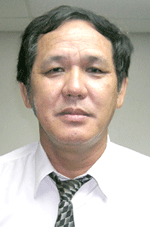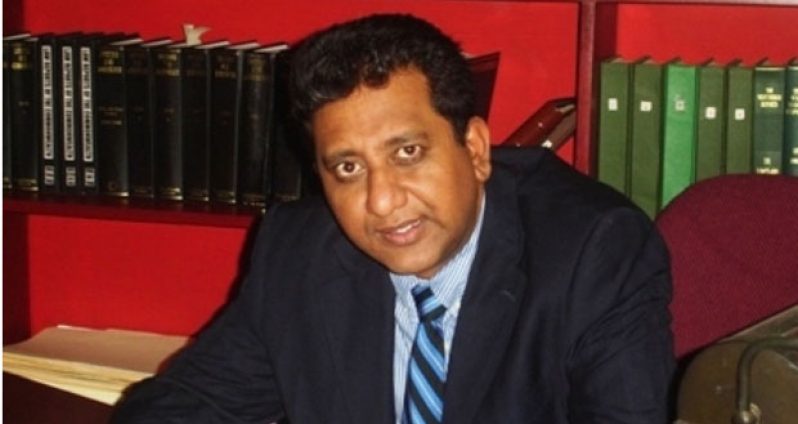CHIEF Justice, Ian Chang on November 14 ruled that Magistrate Sherdell Isaacs-Marcus acted in violation of the constitutional rights, as stated in Article 144 (2) and (e), of Ray Bacchus who was charged for rape in January.
And Attorney General (AG) and Minister of Legal Affairs, Anil Nandlall has appealed the decision.
FIRST APPEARANCE

Ray Bacchus, 38, in early January was placed on $150,000 bail when he appeared before Magistrate Isaacs-Marcus at the New Amsterdam Magistrate’s Court on a rape charge. Bacchus was accused of committing the offence on August 28, 2013 at New Amsterdam. The court was told that he had sexual intercourse with a girl under age 15. The accused denied committing the crime during the police investigations.
On June 2, Magistrate Isaacs-Marcus ruled that Ray Bacchus stand trial in the High Court on the amended Sexual Offences Act.
However, in July, Bacchus’ attorney Murseline Bacchus challenged Magistrate Isaacs-Marcus’ ruling.
The attorney-at-Law moved to the court for an order directed to the Director of Public Prosecution (DPP), the Commissioner of Police and Magistrate Isaacs-Marcus to show why the Magistrate’s decision handed down on June 2, committing Ray Bacchus to stand trial for rape should not be quashed.
The client, Ray Bacchus, in his affidavit stated that his attorney, Murseline Bacchus was not permitted to cross-examine the witness whose statement was filed by the prosecution; nor was he permitted to give evidence or call any witness before he was committed.
As a result, the client contends that his committal is null, void and of no legal effect.
After hearing the affidavit submitted by his attorney, Chief Justice Chang instructed that an Order be issued directing the DPP, the Commissioner of Police and Magistrate Isaacs-Marcus to show cause why the decision of the said Magistrate should not be quashed.
IN FAVOUR OF BACCHUS
After considering the responses, Chang on November 14 stated that constitutional violation occurred when Magistrate Isaacs-Marcus disallowed cross-examination of the makers of prosecution witness statements tendered against the applicant in the preliminary inquiry.
In so far as paragraph 5 of the First Schedule to the Sexual Offences Act purports to disallow cross-examination of the makers of prosecution witness statements, it is inconsistent with Articles 144 (2) (d) and (e) of Guyana’s Constitution.
Article 144 of the Constitution provides:
(1) If a person is charged with a criminal offence, then, unless the charge is withdrawn, the case shall be afforded a fair hearing within a reasonable time by an independent and impartial court established by law.
(2) It shall be the duty of a court to ascertain the truth in every case and every person who is charged with a criminal offence –
a. Shall be presumed to be innocent until he or she is proved or has pleaded guilty;
b. Shall be informed as soon as reasonably practicable in a language that he understands and in detail, of the nature of the offence charged;
c. Shall be given adequate time and facilities for the preparation of his defence;
d. Shall be permitted to defend himself or herself before the court in person or by a legal representative of his or her own choice.
e. Shall be afforded facilities to examine in person or by his or her legal representative the witnesses called by the prosecution before the court and to obtain the attendance and carry out the examination of witnesses to testify on his behalf before the court on the same conditions as those applying to witnesses called by the prosecution.
The AG subsequently filed an appeal of Chang’s ruling.
GROUNDS FOR APPEAL
The appeal filed by the AG cited several grounds, including that:
* The learned Judge erred and misdirected himself in law when he ruled that, in so far as paragraph (5) of the First Schedule of the Sexual Offences Act Cap 8:03 purports to disallow cross-examination of the makers of prosecution witness statements, it is inconsistent with Articles 144 (2) (d) and (e) of the Constitution of the Co-operative Republic of Guyana.
* The learned Judge erred and misdirected himself in law when he ruled that while it does appear that the amended paragraph (5) to the First Schedule to the Sexual Offences Act does afford the person charged, the opportunity of tendering witness statements on the same conditions as are applicable to the witness statements tendered by the prosecution, Article 144 (2) (e) clearly imposes a positive duty on the court to facilitate the examination of prosecution witnesses by the person charged either in person or by his or her legal representative.
* The learned hearing Judge erred and misdirected himself in law when he ruled that the learned Magistrate Sherdel Issacs-Marcus acted in violation of the Respondent/Applicant’s rights under Article 144 (2)(d) and (e) when she disallowed cross-examination of the makers of prosecution witness statements tendered against the applicant in the paper committal proceedings.
* The learned hearing Judge erred and misdirected himself in law when he failed to consider that the specific requirements of Articles 144 (2) (d) and (e) are satisfied by the Sexual Offences Act, Cap 8:03, in particular, the accused is entitled at his trial to cross-examine the prosecution witnesses and give oral evidence.
* The learned hearing Judge erred and misdirected himself in law when he failed to consider that the Applicant’s Constitutional Rights as guaranteed by the specific requirements of Articles 144 (2) (e) are satisfied by the Sexual Offences Act, Cap 8:03 which clearly sets out that the accused shall be afforded the same conditions as those applied to the prosecution.
* The learned judge erred and misdirected himself in law when he failed to take into consideration that the Respondent/Applicant, who was legally represented by Counsel, was given every opportunity to provide evidence and failed or declined to exercise his rights during the paper committal proceedings.
* The learned judged erred and misdirected himself when he failed to consider that a paper committal proceeding is a judicial process to determine whether in the magistrate’s opinion, there is sufficient evidence to commit the accused for trial or to discharge the accused if the magistrate is of the opinion that there is insufficient evidence.
* The learned Judge erred and misdirected himself in law when he failed to consider that the court was by way of Prerogative Writ not appropriately procedurally moved to make a finding of unconstitutionality.
The Attorney General has also since filed a Summons for a Stay of Execution of the judgment of the Chief Justice, which was made on November 14, and is currently awaiting a date for fixture for hearing of the Summons by the Court of Appeal.



.jpg)









